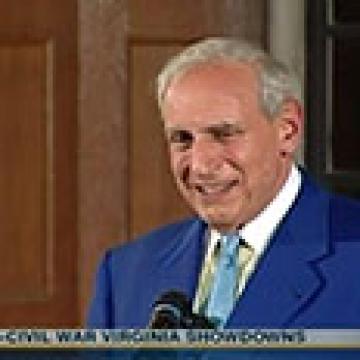William Harrison: Life in Brief
William Henry Harrison served the shortest time of any American President—only thirty-two days. He also was the first President from the Whig Party. He had won his nickname, “Old Tip,” as the tough commanding general of American forces who defeated hostile Native Americans at the Battle of Tippecanoe in the Ohio River Valley in 1811.
Harrison, the youngest of seven children, was born on February 9, 1773, only two years before the American Revolution. His family was among the richest and the most politically prominent in the colony. Harrison's father had served three terms as governor. When young Harrison reached adulthood, he chose a career in the military, a decision that disappointed his father, who had wanted him to become a physician.
Military and Political Involvements
Serving in the Northwest Territories under General "Mad Anthony" Wayne, Harrison advanced to captain and commander of Fort Washington, near present-day Cincinnati. By the late 1790s, he enjoyed a substantial reputation among white settlers as an Indian fighter. President John Adams appointed Harrison secretary of the Northwest Territory in 1798. Two years later, Adams named him governor of the Indian Territory—present day Indiana and Illinois. Presidents Jefferson and Madison kept him in that position for twelve years.
While governor, Harrison negotiated many treaties with the Native Americans of the region, and most of them deprived the Indians of their lands for little money in return. These treaties were signed after Harrison had defeated the tribes in battle, and the peace of the victor was not gentle. For example, when Harrison signed the Treaty of Fort Wayne, the United States acquired three million acres of land with a single document. In another case, he paid the Indians one penny for each 200 acres in a deal that transferred 51 million acres to the United States. When the proud Shawnee chief Tecumseh tried to organize resistance to the advancing white settlers, Harrison led a force of 950 men against his Indian Confederacy, defeating 650 warriors at Tippecanoe Creek on November 7, 1811.
During the War of 1812, Harrison, then a general in the American army, engaged a combined British and Indian force of 1,700 men in the battle at the Thames River in 1813. When the smoke had cleared, Tecumseh, who had joined the British, lay dead. Harrison became a national hero.
After the war, Harrison served in the U.S. House of Representatives from Ohio until 1819. He supported Henry Clay's so-called "American System," which favored internal improvements funded by the federal government. When General Andrew Jackson raided Spanish Florida without specific orders in the First Seminole War (1818), Harrison joined with others in Congress in trying to censure him. This led to great animosity between the two men. Although he now lived and worked in the West, Harrison was still a southerner when it came to slavery. He consistently opposed any attempt by Congress to restrict the spread of slavery or to curtail the authority of slave masters over their slaves.
In the 1820s, Harrison served in the Ohio State Senate, as a U.S. senator from Ohio, and as U.S. minister to Colombia. With Jackson's election, Harrison lost his diplomatic position and retired to his farm in North Bend, Ohio, becoming active in organizing the Whig opposition to Jackson.
Anti-Jackson Candidate
In 1836, the opponents of Andrew Jackson desperately wanted to defeat his handpicked successor, Martin Van Buren, but they had no real party basis from which to work. The anti-Jackson forces tried a very impractical and unusual scheme. They adopted the name "Whigs" (the name of the British party opposed to the monarchy) and ran four candidates from four different regions. They hoped that this tactic would deny Van Buren a majority in the electoral college and thus throw the election into the House of Representatives. Harrison was the Whig candidate of the West. In the election, Harrison came in second, but Van Buren won a majority of both the popular and electoral college vote.
Four years later, the Whigs ran the first modern presidential campaign in American history, with Harrison as their presidential candidate. It was a race filled with songs, advertising, slogans, and organized rallies. In the election campaign of 1840, the Whigs handed out free hard cider in little bottles shaped like log cabins at barbecues and bonfires—and they used the slogan "Old Tippecanoe and Tyler, Too" to promote Harrison's candidacy. (John Tyler was his running mate.)
The incumbent President Martin Van Buren, who came across to the American people as a dandy, as a man who looked and acted like an aristocrat, could not overcome his image. People also held him responsible for the economic collapse in the late 1830s. Harrison won the election with 53 percent of the vote, and more people voted in 1840 than ever before.
Harrison, the oldest man at age sixty-eight (before Ronald Reagan) to be inaugurated President, died after serving only one month in office. He had become ill after delivering his inaugural address outdoors in the cold March weather without a hat or a coat and died of a respiratory infection, probably pneumonia. He was the first President to die in office. Harrison's grandson, Benjamin Harrison, would become President of the United States in 1889.
